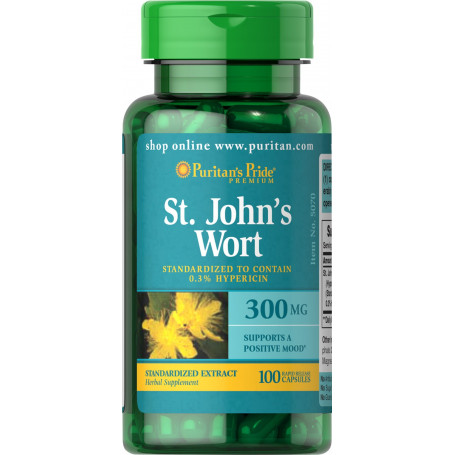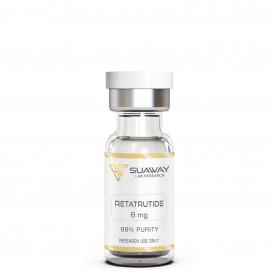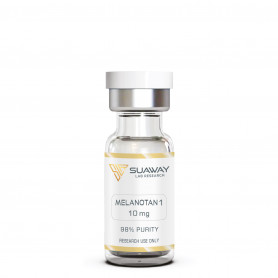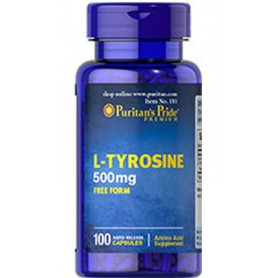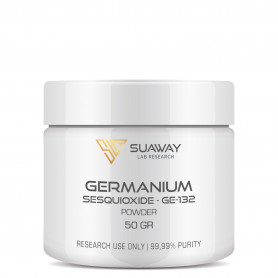ST. JOHN'S WORT STANDARDIZED EXTRACT 300mg - 100 CAPSULES
Anxiety, Menopause-related symptoms, Premenstrual syndrome (PMS), Seasonal affective disorder (SAD), Smoking cessation, Viral infections
Description
St. John's wort is widely believed to boost mood and provide some relief from depression, but it's not exactly clear how it works. Researchers suspect that ingredients in the herb (hypericin and hyperforin) may increase levels of certain brain chemicals, like serotonin. People with depression often have low levels of serotonin and other neurotransmitters.
One reason people may wish to try the natural remedy for depression (as opposed to antidepressants that can increase serotonin) is that St. John's wort tends to have fewer side effects than medications. The herb is also being explored for the following health concerns:
- Anxiety
- Menopause-related symptoms
- Premenstrual syndrome (PMS)
- Seasonal affective disorder (SAD)
- Smoking cessation
- Viral infections
An oil made from St. John’s wort has also been used topically for wound healing and a variety of other skin conditions such as eczema and hemorrhoids.
Depression: The researchers examined 66 previously published studies (with a total of 15,161 participants) and found that both antidepressant medications and St. John's wort extracts were more effective than a placebo for treating mild to moderate depression. People taking St. John's wort were also more likely to continue treatment, as the herb was associated with fewer adverse effects compared to tricyclic and tetracyclic antidepressants, selective serotonin reuptake inhibitors (SSRIs), a noradrenaline reuptake inhibitor (NRI), a serotonin-noradrenaline reuptake inhibitor (SNRI), and noradrenergic and specific serotonergic antidepressant agents (NaSSAs).
Major Depression: Researchers looked at 29 previously published clinical trials (with a total of 5,489 participants) that compared the effects of St. John's wort to a placebo or standard antidepressant medication for a period of four to 12 weeks. The study's authors found that St. John's wort extracts may be more effective than a placebo and were as effective as standard antidepressants. Additionally, the herb appeared to have fewer side effects.
Possible Side Effects: People taking an oral St. John’s wort supplement for a short period of time may experience side effects. These may include:
- Mild stomach upset
- Diarrhea
- Dry mouth
- Headache
- Tiredness
- Dizziness
- Anxiety
- Restlessness
- Tingling
- Allergic skin reactions
- Sexual or erectile dysfunction
- Vivid dreams
When used topically, St. John's wort may cause a skin rash. St. John’s wort (both oral or topical) can also increase the sensitivity of your skin and eyes to sunlight. If you have a condition such as lupus or are taking medication that can cause photosensitivity (such as some acne medications), review the risks and benefits of taking St. John's wort with your doctor or pharmacist.
Possible Drug Interactions: St. John's wort can interact with medication in different ways. It can make some drugs less effective while making the effect of others stronger. The types of medications that may interact with St. John's Wort include:
- Antibiotics
- Antidepressants
- Oral contraceptives
- Immunosuppressants
- Blood thinners such as warfarin
- Sedatives and medications used to treat anxiety
- Drugs used to treat cancer, heart conditions, and HIV/AIDS
- Over-the-counter medications (for sleep, coughs, and colds)
St. John's wort can also interact with other herbs and supplements. You should avoid taking any nutritional supplement or remedy that can raise serotonin, such as 5-hydroxytryptophan (5-HTP), L-tryptophan, or SAMe if you are taking St. John's wort.
Taking St. John's wort with antidepressants or any substance that raises serotonin can cause serotonin syndrome, a potentially dangerous condition resulting from an excess of serotonin. Symptoms of serotonin syndrome include confusion, fever, hallucinations, nausea, loss of muscle coordination, sweating, and shakiness.
If you experience any of these symptoms, stop taking St. John’s wort and seek immediate medical attention. Without treatment, the condition can be fatal.
Contraindications: There may be certain situations where it would be unsafe for you to take a supplement such as St. John's wort or you will need an adjusted dose. For example, if you are pregnant, breastfeeding, trying to conceive, or taking oral contraceptives (birth control pills), it's important to talk with your doctor before you start taking St. John's wort.
St. John's wort may worsen symptoms in people with certain conditions, including:
- Attention deficit-hyperactivity disorder (ADHD)
- Bipolar disorder (may bring on mania or increase speed of cycling)
- Major depression
- Schizophrenia (may increase the risk of psychosis)
- Alzheimer's disease
Some research has indicated taking certain herbal supplements, including St. John's wort, may increase your risk of complications if you are put under anesthesia. You should not take St. John's wort for two weeks before having surgery.5 If you have received an organ transplant, you will need to avoid St. John's wort as it can interact with the medications given to help prevent transplant rejection.

